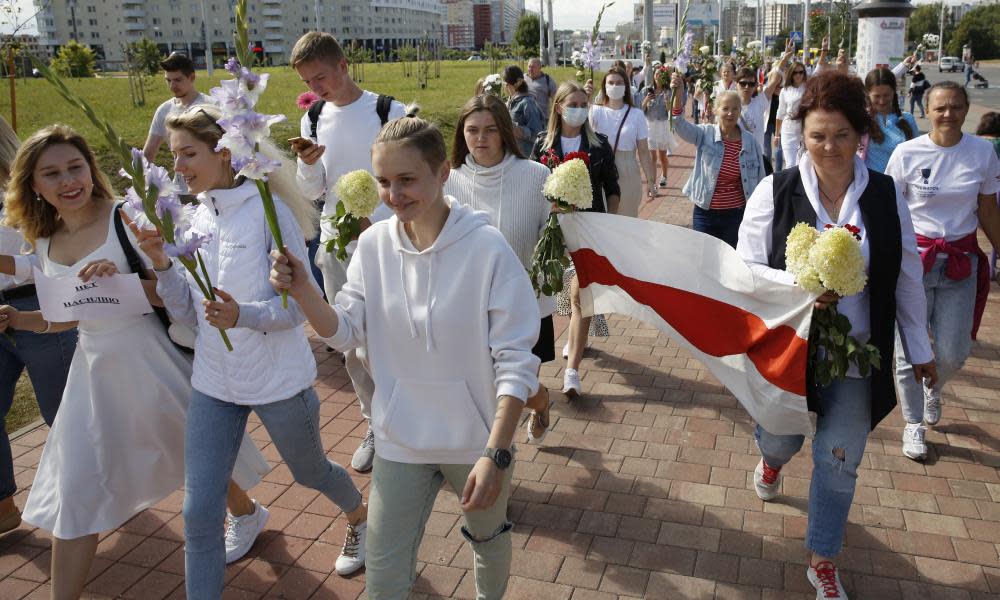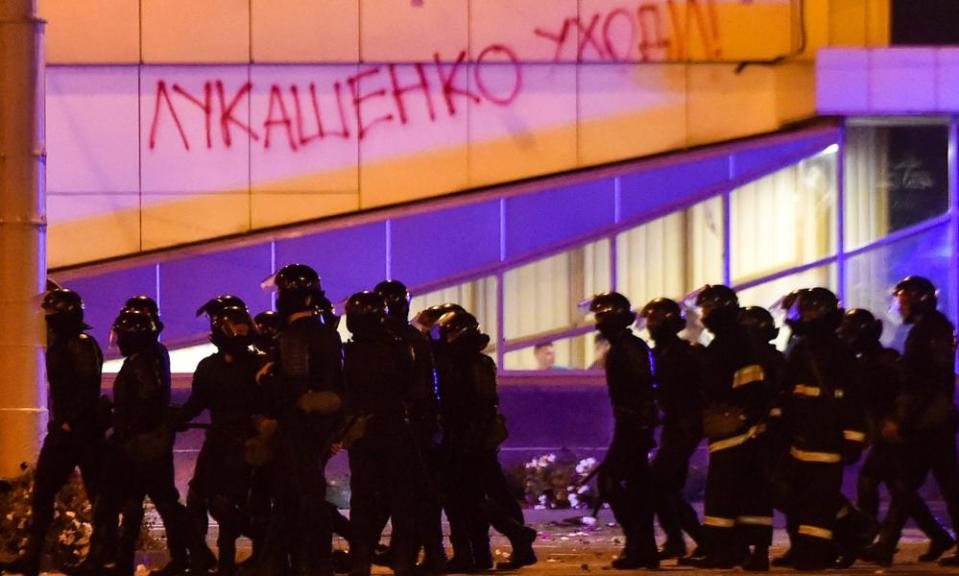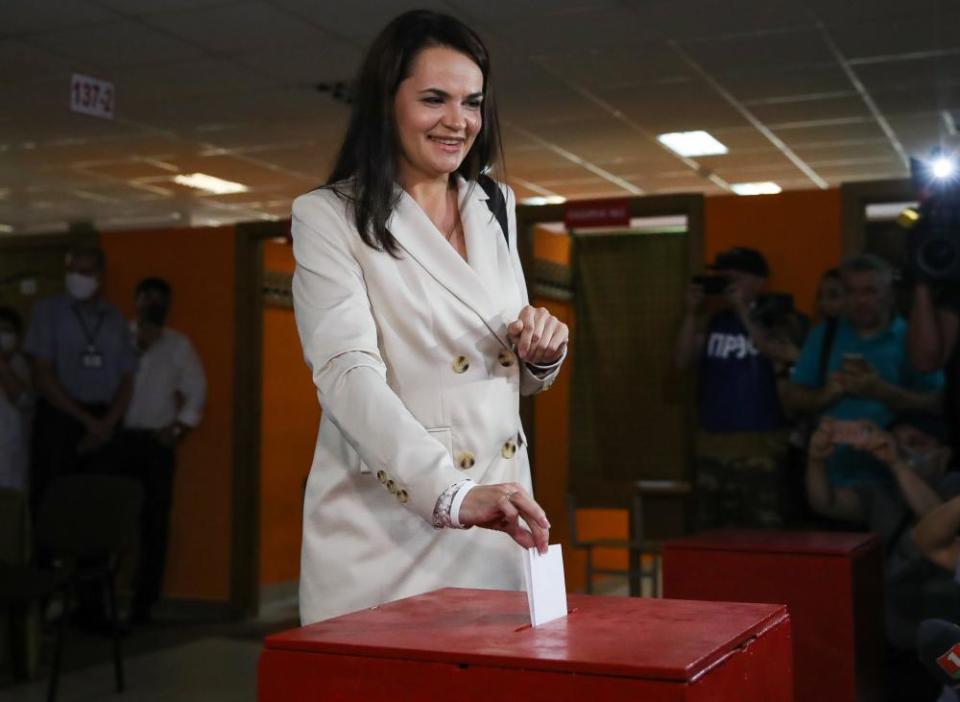Belarus protesters hold peaceful line with flowers and folk songs

Tens of thousands of peaceful protesters have taken to the streets of Minsk, throwing down a renewed challenge to the Belarus president, Alexander Lukashenko, who has faced sustained discontent over what appeared to be a rigged election result on Sunday.
Four nights of ruthless police violence against protesters was meant to force Belarusians into accepting Lukashenko’s victory, but events on Thursday suggested the response had instead breathed new life into the insurrectionary mood.
Related: Belarusians accuse Lukashenko regime of beatings and torture
“We are here to stop the violence. We will never be violent, we do not want a revolution, we just need Lukashenko to leave,” said Daria, 27, a pharmacist, who was waving a bunch of flowers among a crowd walking through Minsk on Thursday afternoon. “We would like there to be negotiations, but if he was going to negotiate then he would have done so already. I think he just has to leave now.”
Belarusian authorities have detained more than 6,700 people since the vote, often subjecting demonstrators to beatings, stun grenades and rubber bullets.
Lukashenko has dismissed the protesters as unemployed extremists, and state television has shown footage of severely beaten youths offering wide-eyed recantations for taking part in the protests.

Several of those who have been detained in recent days told of widespread beatings and abuse inside holding facilities. In the early hours of Thursday authorities confirmed that a young man died in police custody, the second death since the protests began.
The atmosphere in Minsk on Thursday was almost celebratory, a surreal response to the violence that has shocked the country. The protest was decentralised but spread all across the city, as large groups of mainly female protesters walked through the streets, making victory signs and waving flowers.
Later, they formed human chains along central boulevards. They were greeted with horns, cheers and V-signs from a majority of passing cars.
There was no sign of any significant body of support for Lukashenko. The security services and police, who had so viciously put down the protests over recent days, were absent from the centre during the day.
Outside the Minsk philharmonic hall, musicians sang choral music and held up signs saying “my vote was stolen”, cheered on by hundreds of onlookers. As they sang, cars passing along the avenue honked their horns in support.
Despite days of police brutality, peaceful protest is intensifying in Minsk. This from a contributor: pic.twitter.com/EGbsKGz5Mf
— Andrew Roth (@Andrew__Roth) August 13, 2020
“Some people didn’t want to join, but most of us decided to make ourselves heard,” said Dmitry Khlyavich, the conductor of a state-funded choir, who was leading the group in a rendition of a Belarusian folk song.
Outside a cathedral a procession of several hundred worshippers led by three priests waved Bibles in the air and joined in group prayer for an end to the violence. There was also a protest of medics, and reports of strikes at factories.
Lukashenko has ruled Belarus since 1994 and for many years retained a significant base of support for his idiosyncratic form of autocracy, which drew on certain Soviet collective traditions preferred by the former collective-farm manager. But in recent months this approval has been eroded.
Born in August 1954 in Kopys, Belarus, Alexander Lukashenko has served as president of Belarus since the establishment of the office in July 1994. On his initial election, Lukashenko set about establishing an effective dictatorship, sustained by shamelessly rigged elections.
Over the years, Lukashenko has offered his people a sort of Soviet-lite system that prizes tractor production and grain harvests over innovation and political freedoms, and the key part of his political offer has always been political and economic stability.
Lukashenko tried to push this line again into the run-up to 2020’s disputed presidential vote, painting Belarus as an island of stability in a world buffeted by economic crises, political unrest and coronavirus. But the scale of discontent has shown that for many Belarusians, this messaging will no longer work.
The 2020 elections have been described as the deepest crisis he has faced in his career, and in order to secure his supposedly crushing victory, Lukashenko required what appears to be some of the most brazen vote-rigging in recent European history. He appears to have subsequently forced his main opponent, Svetlana Tikhanovskaya, into exile.
After the election, in a congratulatory message, Vladimir Putin urged Lukashenko to consider further economic and legal integration with Russia, which the opposition has warned would undermine Belarus’s sovereignty.
The man sometimes described as “Europe’s last dictator” may have engineered a sixth term in office, but the balance of power has shifted away from him in a way few would have thought possible even a month ago.
In the run up to Sunday’s vote, leading contenders were jailed, but Svetlana Tikhanovskaya, the wife of one of the candidates, was allowed on to the ballot. Tikhanovskaya stood on a platform of swiftly holding a new and fair election. Officially, she received just 9.9% of the vote, though many in Minsk believe she would have won a majority if the votes had been counted fairly.

By Tuesday, Tikhanovskaya was in Lithuania; a video in which she asks people to stop protesting was apparently made after threats were received.
Born in 1982 in Mikashevichy, Belarus, Svetlana Tikhanovskaya rose to prominence as an opposition leader to Alexander Lukashenko, after her husband Siarhei Tsikhanouski, a popular YouTuber, was arrested while preparing to stand for election.
After she announced her intention to run in his place, Belarusian authorities thought they could safely leave Tikhanovskaya on the 2020 election ballot to provide a window dressing of democratic competition. Instead, Tikhanovskaya emerged as a formidable opponent, describing herself not as a leader, but a symbol, and promising swift new elections if she attained power.
One of the “Chernobyl children” hosted in Ireland to help them recuperate from the effects of the nuclear accident in neighbouring Ukraine, as an opposition figure she drew crowds of thousands even in small cities, where people sang along to Changes, the 1987 song by the Soviet rock band Kino that became the soundtrack of a previous generation of people demanding a new kind of politics.
Tikhanovskaya had sent her children out of Belarus during the campaign after she said she had received threats, and then in a video published days after she rejected the official result of the disputed election, a visibly distressed Tikhanovskaya indicated she had faced an ultimatum involving her family. She was forced to flee to neighbouring Lithuania. “God forbid you face the kind of choice that I faced,” she said. “Children are the most important thing in our lives.”
One placard held up by a protester in Minsk on Thursday read: “We have no leader; everything depends on each one of us.”
The crackdown has drawn widespread international criticism. The EU foreign policy chief, Josep Borrell,.said the union would consider “measures against those responsible for the observed violence, unjustified arrests and falsification of election results”. Some officials in neighbouring Russia have also criticised the response.
Much will now depend on whether Lukashenko can retain the loyalty of the riot police and army, who so far have appeared to waver little in their ruthless suppression of popular discontent. The forces were possibly primed to return late on Thursday. On previous evenings, simply walking the streets at night was enough for many people to be arrested and beaten.
Hundreds of people have been injured, and the first fatality was confirmed on Monday when police said a man died after an explosive device went off in his hand. Opposition supporters have blamed police for his death and found videos that appeared to show police opening fire as the man collapsed in the street.
On Thursday the second fatality occurred: Alexander Vikhor, 25, died after being detained on Sunday in the city of Gomel, south-east Belarus. Video footage showed police shooting passersby with rubber bullets and beating demonstrators with truncheons after their arrest.
Belarus’s investigative committee confirmed the death in a press release and claimed Vikhor had been arrested for taking part in the protests. His mother denied that he was a protester and said he had gone to visit a girlfriend on Sunday when he was detained.
There has been very little confirmed violence from the side of protesters, except for a few isolated incidents.

 Yahoo News
Yahoo News 
